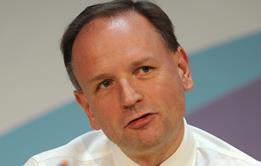Since joining the NHS in 1988, Sir Simon Stevens has undoubtedly had one of the biggest influences on the health service in the last few decades. Here, as he announced his departure from NHS England, HSJ looks at Sir Simon’s career and highlights some of the most significant moments during his tenure.
1988: Simon Stevens joins the NHS through a graduate training scheme. His first NHS roles include serving as a general manager for mental health services in North Tyneside and Northumberland.
1997-2001: Works as an adviser for Labour health secretaries Frank Dobson and Alan Milburn, and within the Department of Health.
2001-04: Promoted to health policy adviser for prime minister Tony Blair, where areas of focus include reducing waiting time targets, extending competition and patient choice, and the creation of foundation trusts.
2004-13: Joins UnitedHealth, whose core business is as a major US health insurer.
23 October 2013: Stevens announced as Sir David Nicholson’s replacement as NHS England CEO. HSJ’s editorial on the same day describes his appointment as a “cause for celebration”.
April 2014: Takes up the role as NHS England chief and, making his first speech, emphasises integration, saying the NHS and local government should test new ways of “blending health and social care for people with high needs” that “don’t need structural re-organisation”. With the advent of the “better care fund”, he cautions: “No-one should pretend just combining two financially leaky buckets will magically create a watertight funding solution.”
22 October 2014: Stevens publishes his first flagship policy document: NHS Five Year Forward View. It calls for a “radical upgrade in prevention and public health” and floats new care models such as multispeciality community provider and primary and acute care systems.
18 May 2015: In his first speech since David Cameron’s election as prime minister, Stevens calls for an extra £8bn of NHS funding per year and sets out details of the NHS’ £22bn efficiency programme – dubbed the “Stevens Challenge”.
3 June 2015: Stevens announces three troubled health economies will be put into a system-wide “success regime” — a clear shift towards managing and planning the NHS through systems rather than single local organisations in competition.
22 May 2016: Ahead of the EU referendum, Stevens warns of Brexit’s impact on the NHS – saying “when the British economy sneezes the NHS catches a cold”.
28 September 2016: Stevens tells HSJ that health economies can drop the long-used “payment by results” in favour of other alternative funding systems, a pattern of shifting away from “click of the turnstile” incentives and the contracting which has dominated for more than 10 years.
March 2017: NHS England publishes Next Steps on the NHS Five Year Forward View, which sets out the first set of “accountable care systems” (the first areas today known as integrated care systems).
8 November 2017: In one of his most vocal and political interventions, Stevens calls on the government to increase NHS funding in its upcoming Budget that month, following Vote Leave’s slogan: “We give £350m a year to Brussels… Let’s Fund our NHS instead”. He says long-standing NHS commitments on elective waiting times are at risk.
19 June 2018: Following drawn-out negotiations, prime minister Theresa May announces an increase in NHS funding by £20bn per year over five years (a 3.4 per cent annual real terms increase) and says this meets the £350m ’Brexit dividend’.
7 January 2019: Stevens fronts the publication of the NHS Long Term Plan, which sets out ambitious plans to improve cancer care, reduce outpatient appointments, and invest in primary and community care.
1 March 2019: Stevens takes control of NHS Improvement as NHSI CEO Ian Dalton quits, following plans to bring the organisations closer together.
27 December 2019: Stevens becomes Sir Simon after being knighted for services to healthcare.
March 2020: Sir Simon leads the NHS’ response to the coronavirus pandemic, which includes rapidly creating seven temporary “Nightingale hospitals” across the country, which are later described as the “ultimate insurance policy”, but get very little use.
11 February 2021: The government publishes its white paper on major legislative reforms to the NHS, which are largely based on recommendations by NHS England/Improvement and include formal proposals to merge the two regulators and make integrated care systems statutory, replacing clinical commissioning groups.
Exclusive: Stevens to step down in July

Sir Simon Stevens is to stand down as chief executive of NHS England at the end of July, HSJ can reveal.
- 1
- 2
- 3
- 4
- 5
 Currently
reading
Currently
reading
Timeline: Simon Stevens in the NHS





































2 Readers' comments